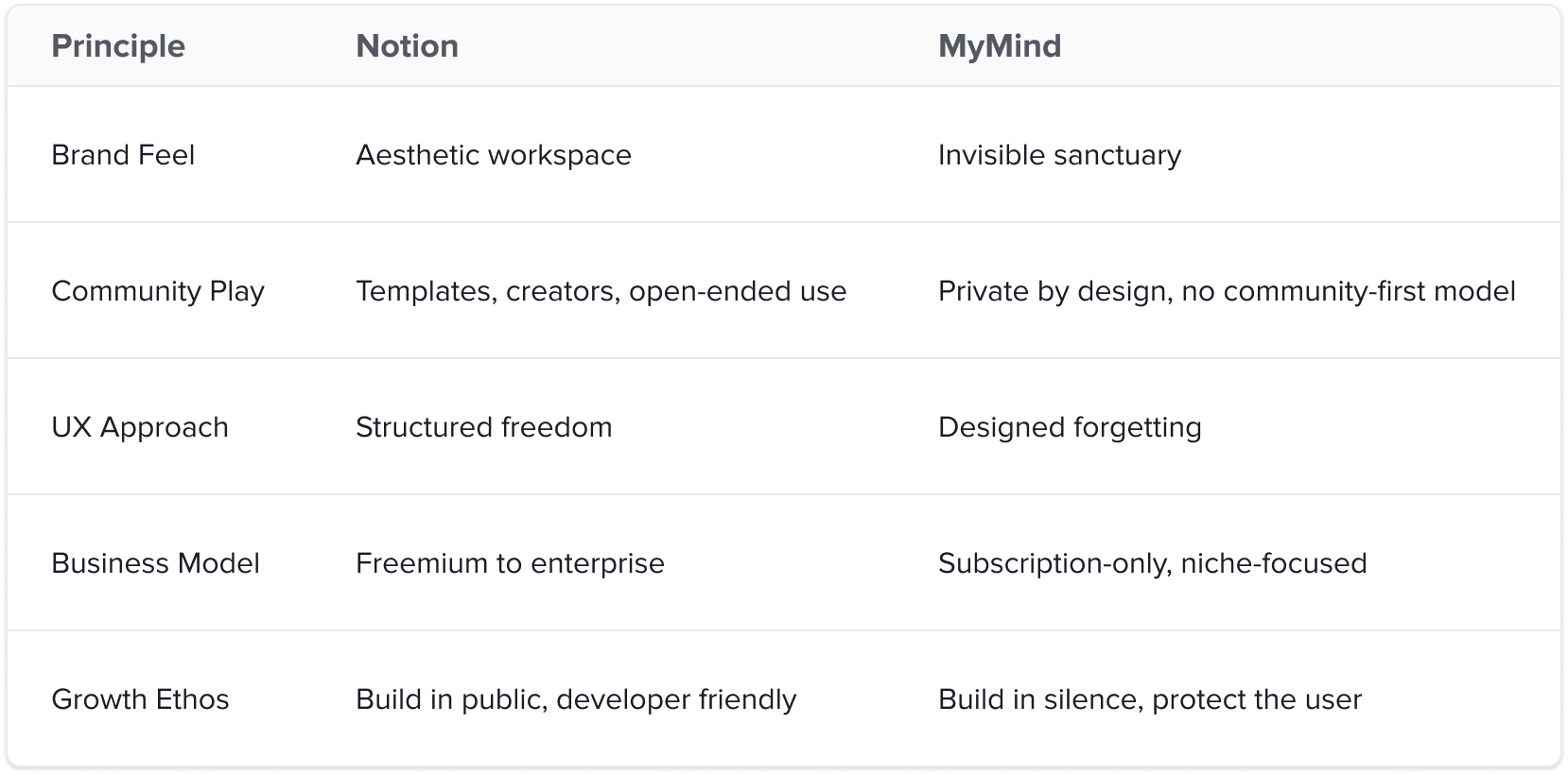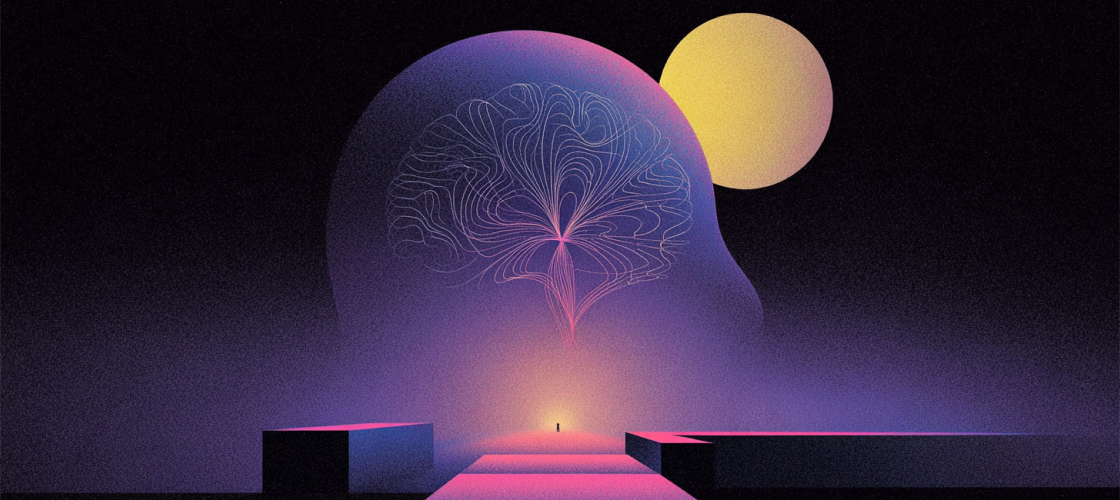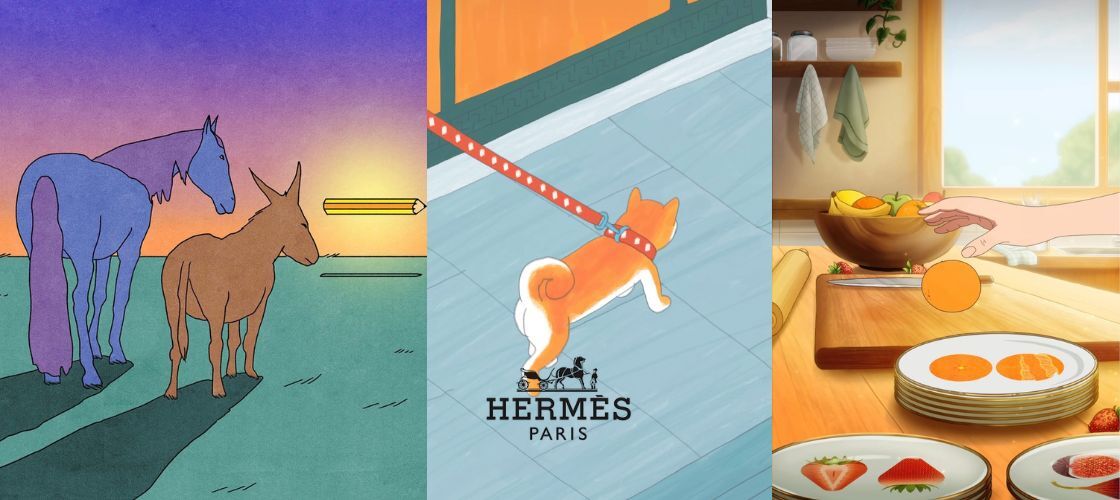Notion isn’t just a tool. It’s a texture. A mood. A modern-day studio in grayscale. You don’t just use it, you move into it.
As someone who builds for founders and creatives, I’m constantly drawn to digital products that carry a certain emotional weight. That feeling when the interface melts away, and what you’re left with is clarity, control, and space to think. Notion and MyMind represent two entirely different philosophies yet both have become quietly iconic in their own way.
One is a structured sandbox. The other is a digital garden that tends itself.
Let’s start with Notion.
Notion didn’t become a $10B company by shouting the loudest. It took its time. Refused venture money early on. Let its product speak first. And more importantly, it gave the internet something it didn’t know it needed: a customizable workspace that looked and felt like a designer made it.
What made it different wasn’t just features. It was how it made people feel. The typography, the white space, the little icons. It didn’t talk down to the user. It let them be the architect. Students, startup teams, YouTubers, coaches, product managers - everyone saw something of themselves in it. That kind of flexibility with clarity is rare.
From a product strategy perspective, Notion is a masterclass in balance. Broad use cases, but narrow aesthetic. High functionality, but minimal visual noise. It doesn’t try to define how you work. It creates a quiet frame for you to decide.
If I had to borrow one lesson: clarity isn’t about minimalism. It’s about helping people feel in control without feeling overwhelmed. That’s where Notion wins.
What does it mean to build software that feels more like a boutique object than an enterprise tool? Notion answers this by pairing craftsmanship with capability. It’s a rare case of being design-led and utility-led without feeling shallow on either end. The result? A product people use and identify with.
Why does this matter? Because in an age of feature parity, how something feels is often the moat. Software products are becoming lifestyle markers. Notion made productivity feel aspirational. It proved that tools don’t need to be sterile to scale.
They built this brand with a small in-house design team and a powerful community flywheel. Templates, icon packs, Twitter threads, YouTube tutorials - the community turned into its own distribution engine. And Notion leaned in, but never let go of the brand discipline.
Now let’s talk about MyMind.
Built by Tobias van Schneider, former Spotify design lead, MyMind takes the opposite route. It asks nothing of you. No folders, no tags, no labels. It’s like having a private digital sketchbook that quietly watches, remembers, and brings things back to you when you need them. It’s not for productivity. It’s for peace.
There is a boldness in what it chooses not to do.
No gamification. No public roadmap. No noise. The design feels almost meditative. And it doesn’t care about your workflows. It cares about your mind being free. The product doesn’t demand input, it gently absorbs.
In a world where software is either shouting for engagement or demanding habits, MyMind is a quiet rebellion.
What it gets right is the invisible UX. It’s deeply personal, and even more intentional. It understands that modern users are exhausted. Tired of organizing, tagging, optimizing.. MyMind says: just save it, we’ll take care of the rest. It uses AI, but that’s not the headline. Instead, it leads with clarity, what the tool actually does to make your life simpler.
It reflects a unique trust in subconscious organization almost like an AI-powered second brain designed to fade into the background.
What does the rise of Notion and MyMind tell us about how we relate to information, identity, and work?
Notion reflects the creative urge to architect our minds through structure. MyMind offers the opposite: the ability to offload our minds without getting overwhelmed.
In a world of productivity noise, calmer, quieter apps are gaining ground. These tools don’t try to dominate your day, they respect your attention. It’s a cultural shift from performing productivity to protecting mental space.
These aren’t just apps. They’re emotional environments.
I replaced Google Docs, Trello, and even parts of Slack with Notion and kept coming back. Not because it was more powerful, but because it felt more mine. Like a digital studio where my thoughts could evolve without friction.
With MyMind, it was different. I didn’t replace anything. I added it. Like a sidecar for the brain. What I learned was this: you don’t need a structured system for every idea. Sometimes, you just need a place to let thoughts exist without pressure.
And that’s what product intimacy looks like. Not daily active usage. But quiet, consistent presence.
If Notion is an architect’s studio, MyMind is a private sketchbook. One encourages you to build and share. The other lets you reflect and hide.
Even their onboarding philosophies reveal this contrast:
These reveal different user psychologies. One thrives on visible progress. The other on private collection. And both are valid.

There’s a reason we keep coming back to some tools and quietly letting go of others. It’s not always about features. It’s about what they make us feel capable of. What they help us see in ourselves. A kind of lifestyle upgrade.
Notion gives us a sense of order and control we can design. MyMind gives us a sense of freedom that we don’t have to and keeps it fluid.
And somewhere between structure and surrender is where the future of software lives.
As builders, that’s the sweet spot worth chasing, not louder features, but deeper resonance.

Alarm clocks are essential tools of modern life, yet for many, they trigger stress rather than support a smooth transition into wakefulness. This in-depth research report explores the overlooked relationship between alarm sound design and the body’s morning stress response, tracing the evolution of alarms and the cultural habits that shaped them. It examines how sonic characteristics directly affect cognition, mood, and physiological arousal upon waking.

For the last decade, the marketing mandate has been simple: Speed. Identify the trend, mimic the trend, monetize the trend. But the machinery of cool has broken down. The trend cycle, which once moved on a breathable 20-year loop, has collapsed into a hyper-accelerated blur of micro-aesthetics that rise and die in weeks. It is time to stop chasing. It is time to build Cultural Antibodies.

Hermès commissioned nearly 80 creatives - illustrators, animators, artists, to generate social-content aligned with “Drawn to Craft.” That means instead of traditional product shots or celebrity ads, you get a mosaic of artistic interpretations keyed to craft, heritage and creative vision.
Drop us a note and we’ll
schedule a free consultation.